Nori Human Fibrinogen ELISA Kit
$461.00 – $832.00
This ELISA kit is for quantification of fibrinogen in human. This is a quick ELISA assay that reduces time to 50% compared to the conventional method, and the entire assay only takes 3 hours. This assay employs the quantitative sandwich enzyme immunoassay technique and uses biotin-streptavidin chemistry to improve the performance of the assays. An antibody specific for fibrinogen has been pre-coated onto a microplate. Standards and samples are pipetted into the wells and any fibrinogen present is bound by the immobilized antibody. After washing away any unbound substances, a detection antibody specific for fibrinogen is added to the wells. Following wash to remove any unbound antibody reagent, a detection reagent is added. After intensive wash a substrate solution is added to the wells and color develops in proportion to the amount of fibrinogen bound in the initial step. The color development is stopped, and the intensity of the color is measured.
Alternative names for fibrinogen: Fibrinogen (factor I)
This product is for laboratory research use only not for diagnostic and therapeutic purposes or any other purposes.
- Description
- How Elisa Works
- Product Citations
- Reviews (0)
Description
Nori Human Fibrinogen ELISA Kit Summary
Alternative names for fibrinogen: Fibrinogen (factor I)
| Assay Type | Solid Phase Sandwich ELISA |
| Format | 96-well Microplate or 96-Well Strip Microplate |
| Method of Detection | Colorimetric |
| Number of Targets Detected | 1 |
| Target Antigen Accession Number | na |
| Assay Length | 3 hours |
| Quantitative/Semiquantitative | Quantitative |
| Sample Type | Plasma, Serum, Cell Culture, Urine, Cell/Tissue Lysates, Synovial Fluid, BAL, |
| Recommended Sample Dilution (Plasma/Serum) | No dilution for sample <ULOQ; sufficient dilution for samples >ULOQ |
| Sensitivity | 120 ng/mL |
| Detection Range | 0.65-40 ug/mL |
| Specificity | Natural and recombinant human fibrinogen |
| Cross-Reactivity | < 0.5% cross-reactivity observed with available related molecules, < 50% cross-species reactivity observed with species tested. |
| Interference | No significant interference observed with available related molecules |
| Storage/Stability | 4 ºC for up to 6 months |
| Usage | For Laboratory Research Use Only. Not for diagnostic or therapeutic use. |
| Additional Notes | The kit allows for use in multiple experiments. |
Standard Curve
Kit Components
1. Pre-coated 96-well Microplate
2. Biotinylated Detection Antibody
3. Streptavidin-HRP Conjugate
4. Lyophilized Standards
5. TMB One-Step Substrate
6. Stop Solution
7. 20 x PBS
8. Assay Buffer
Other Materials Required but not Provided:
1. Microplate Reader capable of measuring absorption at 450 nm
2. Log-log graph paper or computer and software for ELISA data analysis
3. Precision pipettes (1-1000 µl)
4. Multi-channel pipettes (300 µl)
5. Distilled or deionized water
Protocol Outline
1. Prepare all reagents, samples and standards as instructed in the datasheet.
2. Add 100 µl of Standard or samples to each well and incubate 1 h at RT.
3. Add 100 µl of Working Detection Antibody to each well and incubate 1 h at RT.
4. Add 100 µl of Working Streptavidin-HRP to each well and incubate 20 min at RT.
5. Add 100 µl of Substrate to each well and incubate 5-30 min at RT.
6. Add 50 µl of Stop Solution to each well and read at 450 nm immediately.
Background:
Fibrinogen (factor I) is a glycoprotein complex, made in the liver,[1] that circulates in the blood of all vertebrates.[2] During tissue and vascular injury, it is converted enzymatically by thrombin to fibrin and then to a fibrin-based blood clot. Fibrin clots function primarily to occlude blood vessels to stop bleeding. Fibrin also binds and reduces the activity of thrombin. This activity, sometimes referred to as antithrombin I, limits clotting.[1] Fibrin also mediates blood platelet and endothelial cell spreading, tissue fibroblast proliferation, capillary tube formation, and angiogenesis and thereby promotes revascularization and wound healing.[3] Reduced and/or dysfunctional fibrinogens occur in various congenital and acquired human fibrinogen-related disorders. These disorders represent a group of rare conditions in which individuals may present with severe episodes of pathological bleeding and thrombosis; these conditions are treated by supplementing blood fibrinogen levels and inhibiting blood clotting, respectively.[4] These disorders may also be the cause of certain liver and kidney diseases.[1] Fibrinogen is a “positive” acute-phase protein, i.e. its blood levels rise in response to systemic inflammation, tissue injury, and certain other events. It is also elevated in various cancers. Elevated levels of fibrinogen in inflammation as well as cancer and other conditions have been suggested to be the cause of thrombosis and vascular injury that accompanies these conditions.[5][6] Several disorders in the quantity and/or quality of fibrinogen cause pathological bleeding, pathological blood clotting, and/or the deposition of fibrinogen in the liver, kidneys, and other tissues.
References
- de Moerloose P, et al. (2013). Seminars in Thrombosis and Hemostasis. 39(6): 585–95.
- Yong J, Doolittle RF (2003). Proc Natl Acad Sci USA. 100(13): 7527–7532.
- Mosesson MW (2005). Journal of Thrombosis and Haemostasis. 3(8): 1894–904.
- Casini A, et al. (2016). Seminars in Thrombosis and Hemostasis. 42(4): 366–74.
- Davalos D, Akassoglou K (2012). Seminars in Immunopathology. 34(1): 43–62.
- Repetto O, De Re V (2017). Annals of the New York Academy of Sciences. 1404(1): 27–48.
Product Citations
Be the first to review “Nori Human Fibrinogen ELISA Kit”
You must be logged in to post a review.




























Reviews
There are no reviews yet.